
Can You Sell Wholesale Items as Your Own Brand?
Have you dreamed of launching your own brand but felt overwhelmed by the complexities of manufacturing products and building a brand? Imagine bypassing the daunting manufacturing process and diving straight into building a brand that reflects your unique vision. The good news is, yes, you can resell wholesale products as your own brand as long as you have an ABN, a legitimate business licence and your wholesaler allows it.
Buying and reselling wholesale products is one of the most lucrative ways to set up your online store. You can buy quality wholesale products and transform them into a distinct brand that captivates your audience. Reselling wholesale products allows you to skip the lengthy and expensive process of manufacturing, letting you focus on what truly matters - branding, marketing, and customer engagement. Additionally, you can get selling in no time with less risk.
Whether you’re an entrepreneur looking to make a mark or an ecommerce business owner seeking to expand your product line, reselling wholesale products offers a flexible and efficient way to achieve your business goals. In this blog, we’ll explore how to leverage wholesale reselling strategy to build a successful, personalised brand without reinventing the wheel.
How does the wholesale business model work?
Wholesale businesses are an integral part of the retail industry, as they allow retailers to purchase products at discounted prices, which they can then sell at an increased retail price to earn a profit.
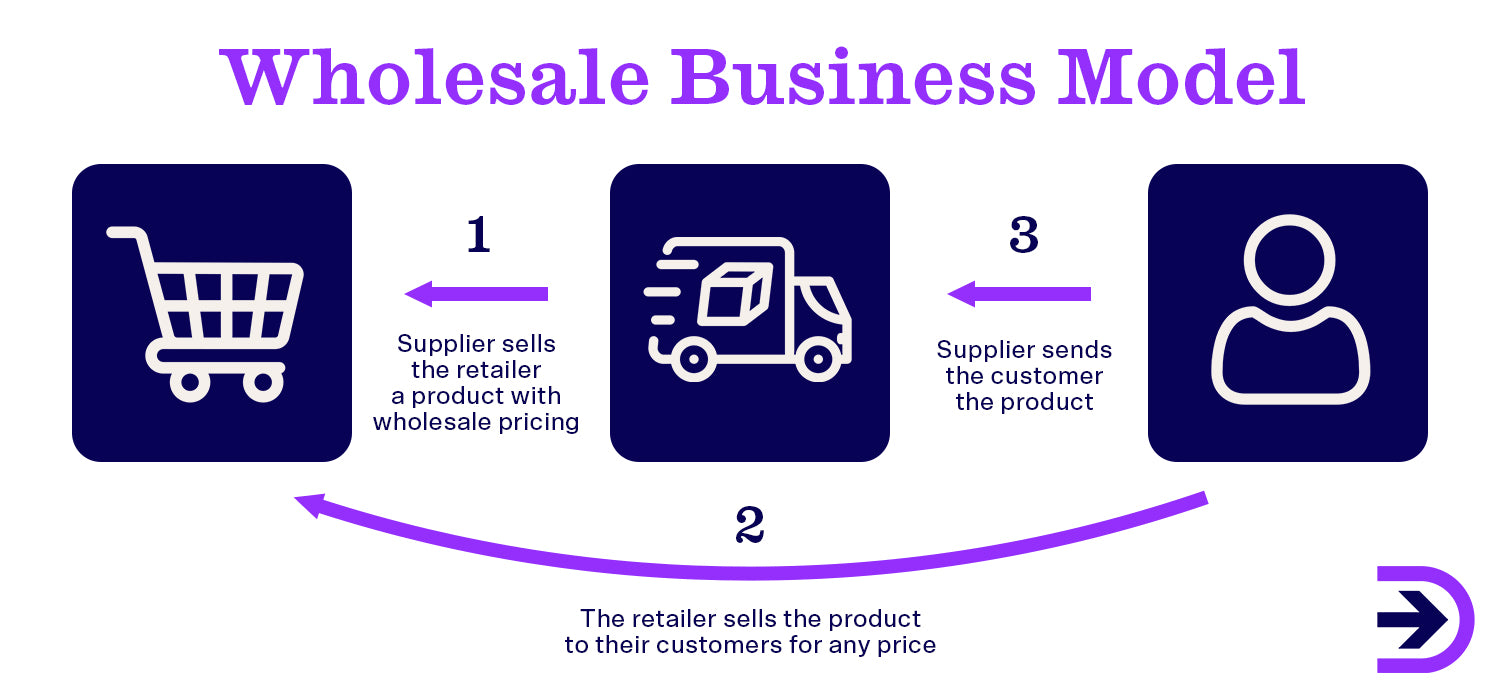
There are two different types of business models when it comes to wholesale. The first is when a business buys large quantities of products from manufacturers, and stores those products in their warehouse ready to be sold to other businesses and retailers. The second is when a wholesale business sells its own products to other businesses and retailers.
Wholesalers make their money by selling goods to retailers for a higher price than what they originally paid the manufacturer. For example, they will purchase large quantities from manufacturers, and then sell to retailers on a smaller scale for an increased price. This means they will always come out the other end with a profit. The same goes for retailers reselling to customers. They purchase from wholesalers in large quantities, and customers will then buy one or more products each transaction for an increased price.
With wholesale, everybody involved wins. Customers are getting regular, high-quality stock for reasonable prices, and retailers and wholesalers are earning a profit to help grow and scale their businesses.
Benefits of buying wholesale
Wholesale makes the retailer’s life easier, and there are a few benefits that come with buying and reselling using the wholesale method.
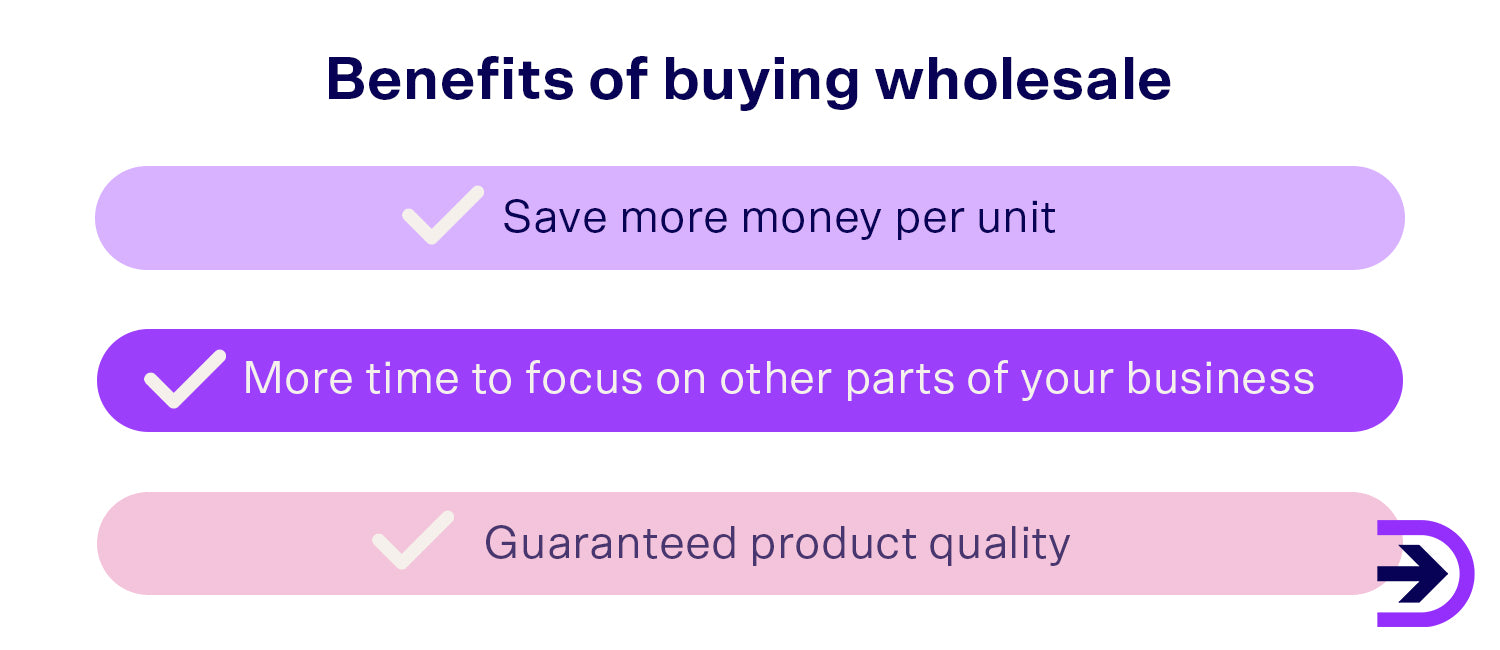
Save more money per unit
You can reduce business costs by saving money when you buy products at the wholesale price because you will get regular discounts for buying in bulk. The rate at which you need to purchase wholesale products will also be reduced, giving business owners more opportunities to make a profit when they resell products.
If you’re working with a reputable wholesaler, chances are they’ll be able to offer you deals and discounts regularly, especially if you’ve built a good business relationship. Professional wholesalers will be able to pick out the best suppliers and manufacturers to deliver you the best quality products at the best price, so you can easily build the business of your dreams.
More time to focus on other parts of your business
If you choose to buy wholesale, you can also save yourself a lot of time, as you don’t have to worry about finding manufacturers and making products from scratch. That process is already done for you, and by the time you are ready to buy products, the wholesaler has them ready to go from you straight to the end consumer. Even better if your wholesaler has dropshipping options, as you won’t have to worry about storing and shipping the product to the customer. This will leave you with some extra time up your sleeve to focus on other significant things like developing marketing strategies, enhancing your customer experience and building your brand.
Guaranteed product quality
Buying from reputable wholesalers means you have the safety net of knowing the products you are reselling will be of high quality, and therefore, the products are most likely to sell. These products will have already been tested on customers, so you remove the stress of wondering if anyone will want to buy what you are selling.
How do you sell wholesale items under your own brand?
Buying wholesale is popular with most retailers because it offers great prices. You usually buy in bulk at a big discount once you meet the minimum order quantity set by wholesalers. From there, you can sell those items under your own brand name for your chosen retail price in order to make an adequate profit margin.
The steps to selling wholesale items under your own brand name are as follows:
1. Set up an ABN and relevant business licenses.
Having an ABN and relevant business licences make you eligible to resell wholesale products. If you're unsure of what kinds of legalities you need to consider, we will go through this step in more detail later.
2. Find a wholesaler
The next step to reselling wholesale items is to find wholesale suppliers to work with and purchase from. There are a couple of different ways to do this, the first is by approaching individual wholesalers or distributors who sell the kinds of products you are looking for. Another option is to use a B2B marketplace that sells wholesale items, making the process simpler.
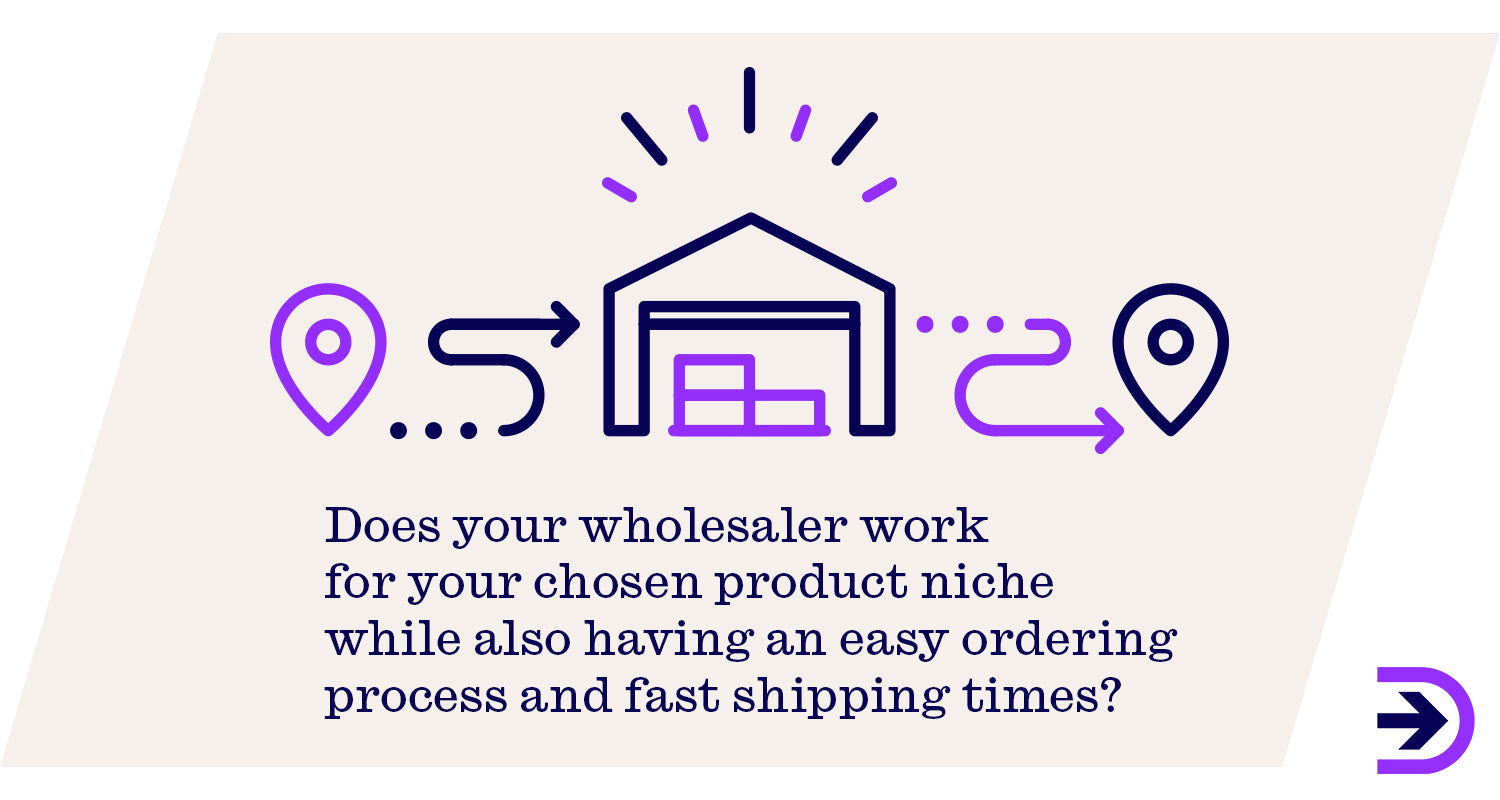
You’ll want to make sure that the wholesaler you choose will work with your chosen product niche while also having an easy ordering process and fast shipping times. You don’t want to find that reordering your bestselling products takes months to do and run the risk of facing stockouts, you want to work with wholesalers who act fast and are capable of keeping up with changes in supply demands.
One of the simplest ways to find wholesalers is by using wholesale marketplaces that give you the option to browse products and choose the products you want to resell all in one place. Dropshipzone, Australia’s leading B2B2C marketplace, works with local retailers and suppliers so you can easily resell wholesale items on your online store. When you dropship with Dropshipzone, you don’t have to worry about holding inventory or managing shipping logistics as suppliers ship products directly to customers' addresses from their warehouses. Furthermore, suppliers can expand their reach and market presence by partnering with multiple retailers without the need for extensive marketing efforts.
With other reselling methods, you have to find a place to store your items and make sure you are ordering the correct amounts of each product without overstocking or selling out. You can rest easy knowing you are working with trusted wholesalers to bring your customers the best quality products, without wasting time traipsing the internet looking for legitimate wholesalers who aren’t scammers.
3. Contact the wholesaler
Once you've put together a list of potential wholesalers, preferably those based in your location to reduce shipping times, you can start to contact them and figure out who you want to work with. You could simply give a phone call or send an email to get the ball rolling, and the wholesalers will inform you about the next steps in their process.
4. Go over terms and conditions with your wholesaler
Now that you have a wholesaler, or multiple wholesalers, to work with, they will have some T&Cs that you will need to comply with.
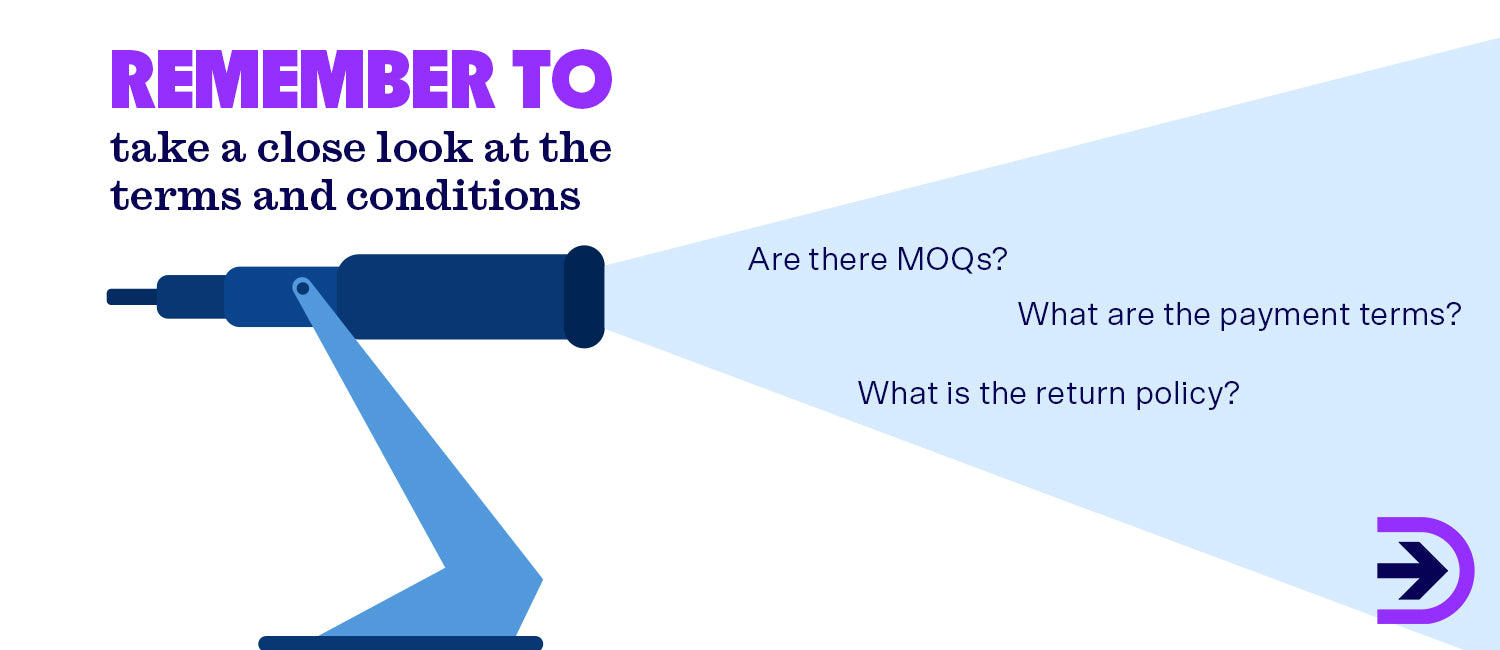
Each wholesaler will have a different minimum order quantity that you will need to meet to be eligible to receive wholesale discounts, as well as varying payment terms about how and when you must make your payments.
Wholesalers will often have a retail price you must meet to resell their products, and this is usually to make sure the retailer makes a profit while avoiding a huge gap between the wholesale and retail price.
You'll want to be across your wholesaler's return and exchange policies to make sure you are prepared for things like defective items, incorrect orders or unsatisfactory product quality.
5. Place your first order
Once you are aware of things like minimum order quantities, you can place your first order with your wholesaler. Make sure you've put the necessary amount of thought into what you are ordering and how it works with your brand, as well as if you have ordered an adequate amount.
6. Set your retail price
You can use different online tools to help you set your retail price based on the profit margin you are aiming for, just make sure your prices are in line with your wholesaler.
You’ll want to make sure that your retail pricing is in line with your competitors, as customers often choose to shop online because they can easily compare the prices of different products in a few clicks. If they come across your products, but see that a different retailer is offering those products at a discounted price, chances are they will choose your competitor and you will lose out on sales. So, while you want your profit margin to be as high as possible and ensure your retail pricing is different from the wholesale pricing, you also want to make sure your pricing is competitive.
7. Place re-orders as necessary
Now that you are across everything to do with buying and reselling wholesale, you can re-order as necessary. Setting up automated systems will help give you instantaneous snapshots of the products that are running low, and having a good understanding of how your customers shop will make you an expert in no time.
Things to consider when buying and reselling wholesale
Buying wholesale products to resell can be a lucrative venture for entrepreneurs looking to start or expand their businesses. However, there are several additional factors to consider to run a successful online business.
Stock levels
Among the most difficult things to get right in retail is keeping consistent stock levels. Managing stock levels is crucial when buying wholesale. If you can manage to master it, you will see a massive improvement in sales. You should make sure your wholesaler has some good systems in place to deal with changes in demand to minimise any risks.
When buying wholesale, you are ordering a bulk amount of product to then resell, so you'll want to make sure you’ve ordered just enough products. Overestimating demand can lead to excess inventory, while underestimating it can result in stockouts and lost sales.
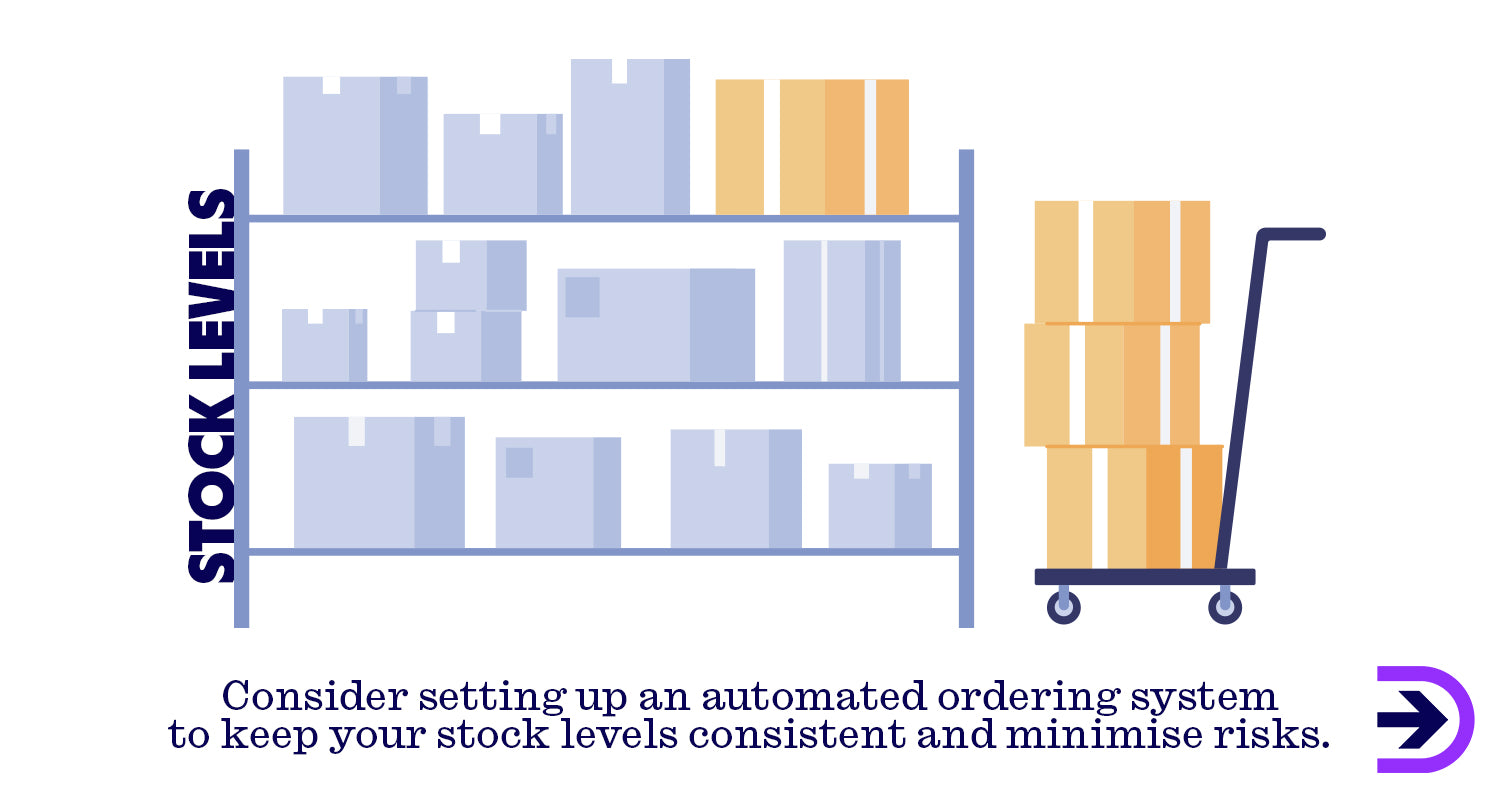
Setting up an automated ordering system and utilising inventory management tools are great ways to forecast demand accurately, keep track of stock in real-time, and avoid the pain points associated with inventory so you know exactly when to order more of a particular product. Reorder points can calculate how much of something you will need to buy and when based on your sales history, and you’ll be able to easily spot which item levels are looking low. Balancing stock levels ensures you can meet customer demands without tying up too much capital in unsold goods.
Adequate storage space
If you’ve chosen to sell wholesale products and stock the items yourself, you’re going to need space to store the products. No one wants their products taking up space in the spare room of their house, and if you’re serious about starting a successful online business, you should consider renting out a space. Adequate storage is essential for managing wholesale purchases by keeping your stock levels organised.
Depending on the volume and type of products, you’ll need to figure out if you need a warehouse, storage unit, or even dedicated space within your business premises. Additionally, consider factors such as climate control, security, and accessibility when choosing a storage location. Proper storage solutions help maintain product quality and streamline your supply chain operations. An unorganised space is a disaster waiting to happen, so to avoid missing out on sales, you’ll want to cultivate a professional and functional warehouse environment.
Customer experience
Based on a recent study, business professionals have stated that their main priority and focus for the next five years is the customer experience, so it’s safe to say that this is an important thing to consider when choosing the wholesalers you want to work with.
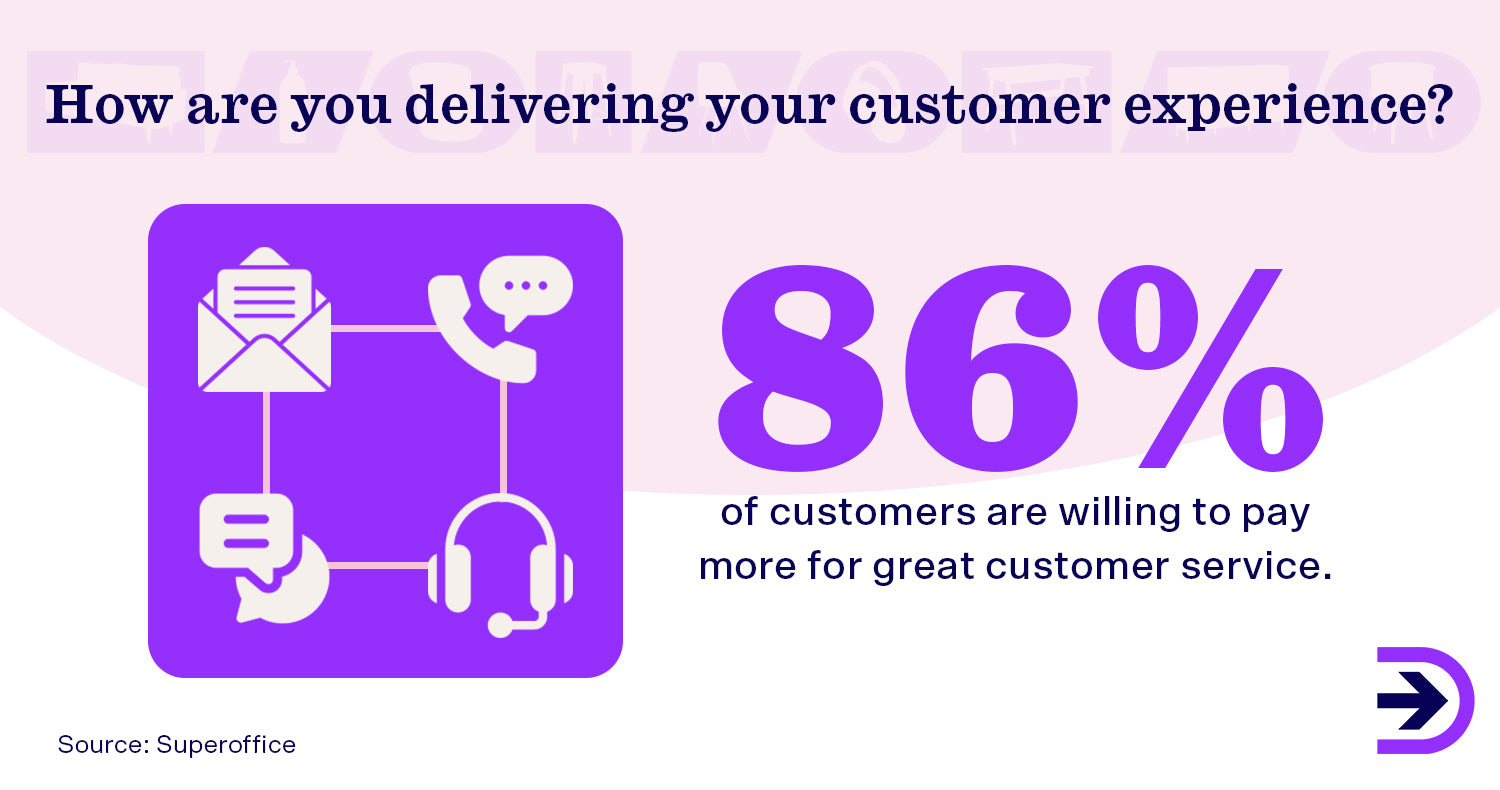
86 per cent of customers are willing to pay more for great customer service, so investing in the customer experience is a great way to place you ahead of your competitors. Having easy-to-navigate online stores, excellent customer service, prompt responsive communication, efficient ordering processes, hassle-free returns, and reliable shipping can improve customer satisfaction and set your business apart from competitors.
44 per cent of shoppers will make repeat purchases after experiencing a personalised experience. To encourage repeat purchases, you must think about what your business can provide that your competitors can’t, whether it’s a free tester included based on what the customer purchased or a personalised thank you email. This can help you provide an excellent shopping experience to your customers and build a loyal customer base.
With a strong focus on customer experience, you can boost product sales and justify higher prices, thereby increasing your profit margin. A big part of creating great customer experiences is getting to know who your customers are and what they want, and that starts with doing some market research. Do some digging, and find out the age and occupation of your customer. What do they like doing on the weekends? What are some of their biggest selling points when it comes to the products you are marketing? The deeper your research goes, the more likely you are going to come up with a great plan to improve customer experiences and drive loyalty. And, the more reliable your wholesaler is, the more time you will have to spend developing great customer service.
Product quality
Along with personalised experiences and extensive market research, the quality of your products will help earn customer loyalty and improve brand recognition. Providing poor quality products can impact your brand reputation. Customers who know the quality of certain products is exceptional are much more likely to continue to repurchase and trust retailers. So, when choosing a wholesale business to work with, you want to ensure you source products from reliable wholesalers who offer consistent quality. Conduct quality checks on samples before committing to large orders. Selling high-quality products reduces returns and complaints, fosters customer satisfaction, and builds trust in your brand.
Pricing strategy
Developing a competitive pricing strategy is crucial for profitability. Research the market to understand competitor pricing and determine your cost structures, including wholesale prices, shipping, storage, and other expenses. Set prices that cover costs and provide a healthy profit margin while remaining attractive to customers. Regularly review and adjust your pricing strategy to respond to market changes and maintain competitiveness.
Marketing and promotion
Effectively marketing your products is essential to drive sales. Develop a comprehensive marketing strategy that includes online advertising, social media promotion, email marketing, and possibly influencer partnerships. Highlight unique selling points and leverage customer reviews and testimonials to build credibility. Consistent and targeted marketing efforts help increase brand awareness and attract potential buyers.
What are the legalities to consider when reselling?
It’s important to be aware of the relevant legalities and your state’s requirements for selling wholesale products. Some countries, like America, will have retailers and customers pay a sales tax, and it is the job of the retailer to collect sales tax based on the different laws in different states.
You can check out detailed information about Australian industry laws and regulations here, but here are the basics you need to know. There are different permits and licences needed to sell in Australia. So, be sure to check your official government website to see if you need any licences or approvals for wholesale reselling.
Licences and permits
When reselling wholesale products, ensure you have the necessary licences and permits required by your local jurisdiction. These may include business licences, permits for resale, or specific industry certifications. Having proper licences not only keeps your business compliant with legal requirements but also builds trust with customers and wholesale suppliers.
You’ll need an ABN and other relevant licences to ensure you have the right to sell products, goods and services in Australia. You will need to comply with the Australian Consumer Law, as well as the Consumer Product Safety and Information Standardsbecause you will be supplying products and goods to consumers. Once you have a business name, you need to register your name in the National Business Name Registration and a domain name to give you an online identity.
You can learn more about what you might need depending on whether you are a sole trader or a company with a partnership here. And if you’re feeling overwhelmed and worried you might miss out on some of the legalities, you can use this customisable tool to help you figure it all out.
The retail and wholesale trade industry in Australia has specific insurance policies, including public and product liability insurance, equipment and machinery, property and buildings, vehicles, and business interruption. So before you start reselling, you’ll need to make sure you are up to speed with these policies.
Taxation
Understanding the tax implications of reselling goods is crucial, as it can impact your net profit and cause legal complications. Depending on your location and the nature of your business, you may need a Tax File Number (TFN). You may also need to collect sales tax from customers and remit it to the relevant authorities. Ensure you pay sales tax and goods and services tax (GST). GST is a tax of 10 per cent on any goods or services sold or consumed in Australia, and the business owner must collect this money and pay it to the ATO. Businesses with a GST turnover of $75,000 or more will need to register for GST, otherwise, registration for GST is optional.
Once registered with the Australian Taxation Office (ATO), you can claim your GST credits. Additionally, be aware of income tax obligations related to profits earned from reselling activities. Consulting with a tax professional can help ensure compliance and optimise your tax strategy.
Environmental impact
Consider the environmental footprint of the products you wish to resell in your online store. Some items may have sustainability concerns or regulatory requirements related to their production, use, or disposal. Being aware of environmental impacts can help you make informed decisions about the products you carry and potentially attract eco-conscious customers.
When packaging your products or choosing what wholesale business you are going to work with, keep in mind things like state-wide single-use plastic bans and waste management. If you’re reselling electronics, ensure they are properly labelled and that you or your wholesale partner is acting sustainably and properly recycling and disposing of products.
Product warranties and liabilities
When reselling products, it's crucial to understand the warranties provided by manufacturers or wholesale suppliers. Warranties outline the terms under which a product can be repaired or replaced if it malfunctions within a specified period.
As a reseller, you must understand the warranties associated with the products you wish to resell and any other liabilities that may arise from defects or malfunctions. You may be responsible for facilitating warranty claims on behalf of customers. It's important to communicate warranty details clearly to customers to manage expectations, avoid customer dissatisfaction, and ensure compliance with consumer protection laws. Additionally, be aware of liabilities that could arise from defective products causing harm or damage and be prepared to handle returns or repairs as per manufacturer’s guidelines or consumer protection laws. Mitigate risks by sourcing products from reputable wholesale suppliers and understanding your legal responsibilities in case of product faults.
Consumer protection laws
Familiarise yourself with consumer protection laws that apply to your business. Consumer protection laws vary by region, but they are generally designed to ensure fair and transparent business practices and protect consumers from deceptive or unfair treatment. These laws govern various aspects of the consumer-retailer relationship, including advertising practices, product safety standards, and consumer rights regarding refunds and warranties. As a reseller, you must comply with these laws to avoid legal repercussions and maintain trust with customers. Adhering to these laws not only protects consumers but also safeguards your business from legal disputes and reputational damage. Stay updated on relevant regulations and implement policies that align with consumer rights, such as clear return policies and accurate product descriptions. Proactively addressing consumer concerns can enhance your reputation and build long-term customer loyalty.
Can you relabel these products?
If you are buying wholesale products to resell, you are legally allowed to relabel these products with your own brand name, custom logo, or design. However, you just want to ensure your wholesaler has allowed it in their terms and conditions.
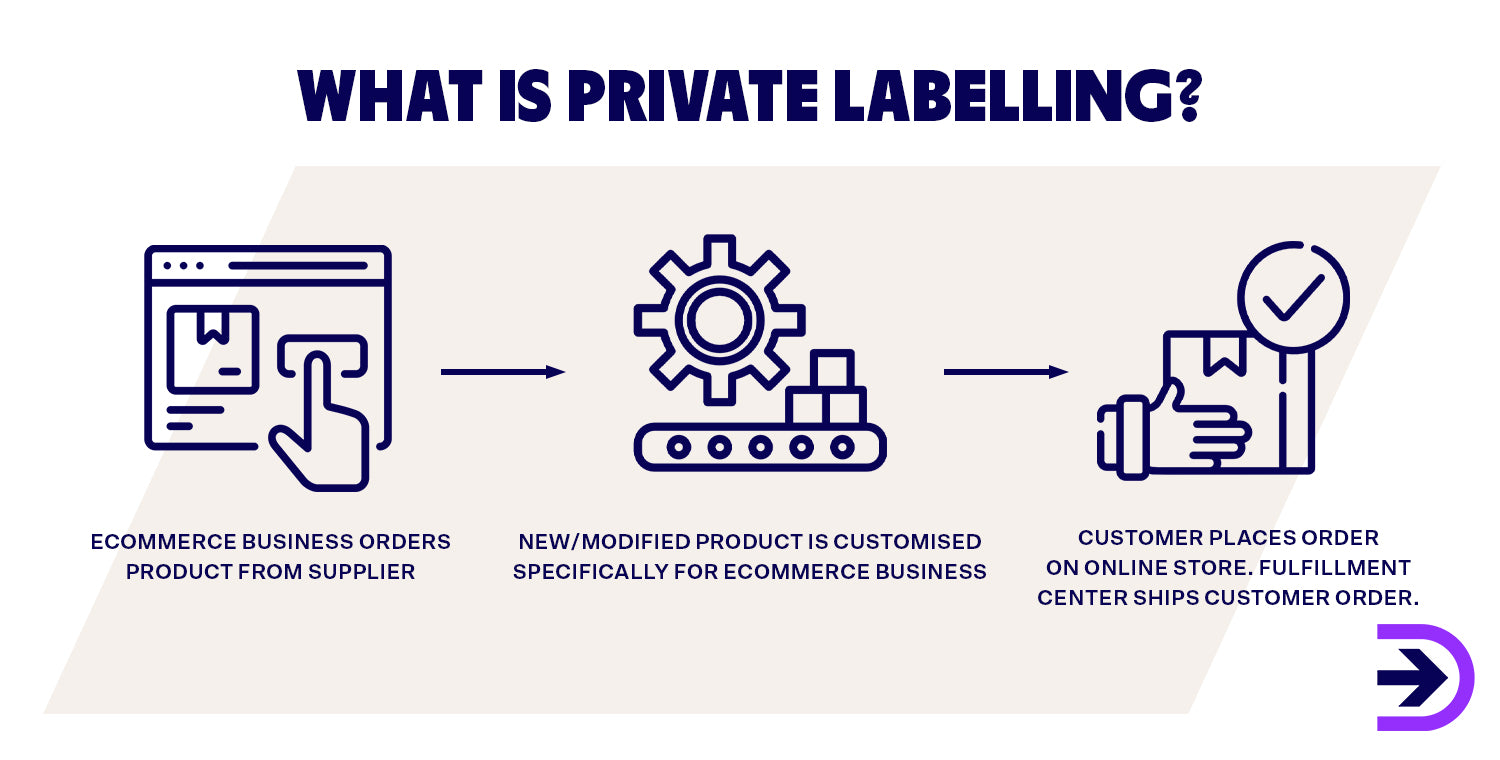
Relabelling products, or private labelling, allows small business owners to kickstart their business without having to spend the time and money developing their own branded products, which can take years to do. Instead, becoming a private label distributor allows you to sell a wholesaler’s product under your own brand name and skip out on all the in-between to create instant opportunities.
There are many companies that are private label product distributors, some of the biggest examples including Costco and Amazon. Many of Costco’s items are sold by their competitors from the same wholesalers. The AmazonBasics range isn’t directly manufactured by Amazon and is instead purchased from wholesalers and then relabelled.
Relabelling allows you to figure out what works best for your company without spending the time and money it would take to manufacture items from scratch. You can easily expand your current products and make a splash in the ecommerce space with less of a risk of failure.
Depending on what you are reselling and who your wholesaler is, you will want to relabel these products before you resell. Take clothing, many wholesalers will send out these products with blank labels for you to easily replace with your brand name. With something like electronics, however, it may be harder and more expensive to relabel these products once they are manufactured.
The most important thing to remember before relabelling products is that you have legal permission to do it. If you are reselling something as your own brand that has been trademarked by another brand, you could end up facing legal action being taken against you.
Relabelling branded products is illegal and risks you being involved in copyright or Intellectual Property (IP) infringement problems. So make sure you’re doing everything by the book. Additionally, you must ensure that the labels you use complies with specific laws in the country or state you plan to sell the products.
How does dropshipping work with wholesale reselling?
As we previously discussed, traditional wholesale reselling means that once the retailer receives the goods, they are in charge of storing and distributing those products to their customers. When you introduce dropshipping into the equation, you remove a lot of the hassle associated with keeping your retail store fully stocked.
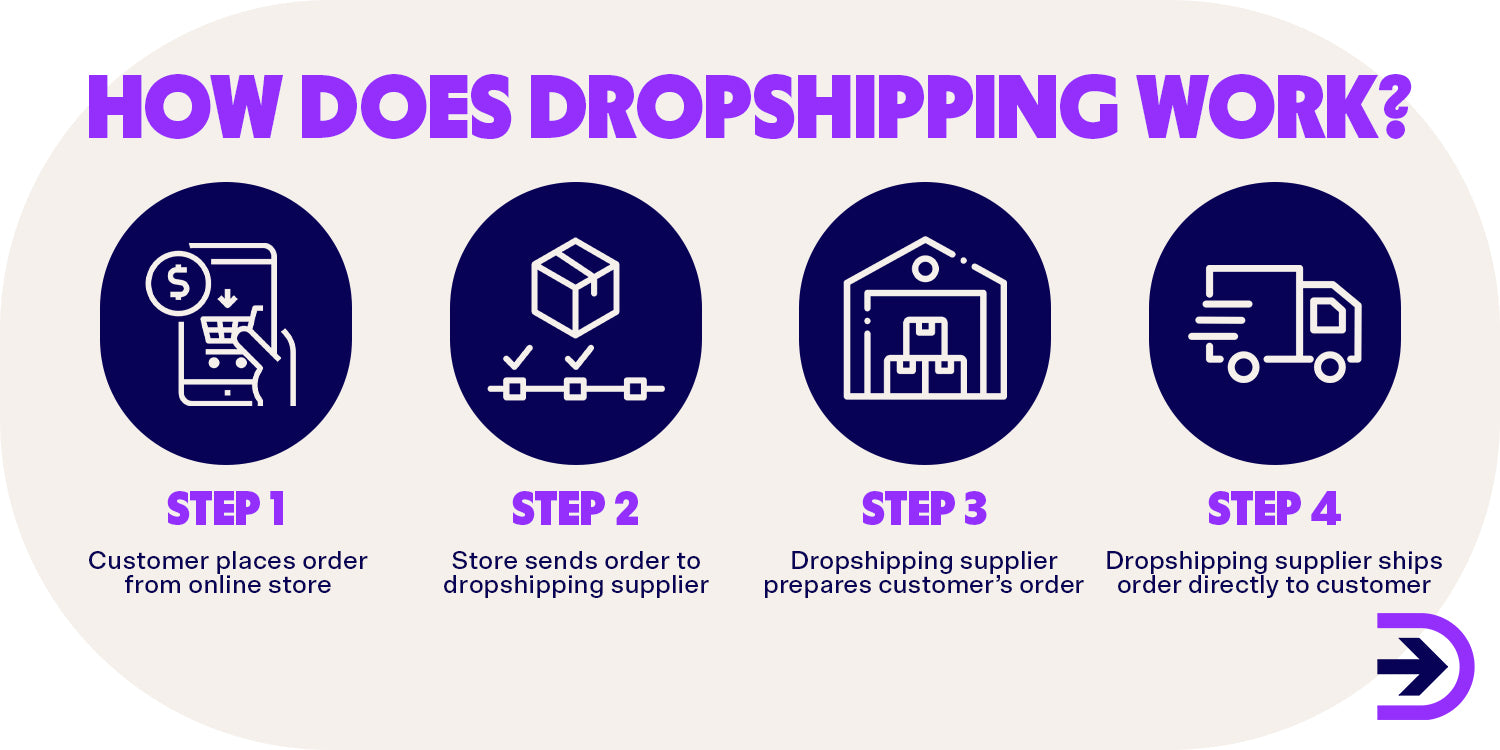
Instead of you purchasing products from the wholesaler and selling them for the suggested retail price to customers, you purchase products from the wholesaler only once a customer has placed an order. From there, the wholesaler distributes the products directly to your customers, so you don’t have to worry about holding any physical inventory. You’ll make your profit as you would with traditional wholesale; by marking up your products to a recommended retail price.
Wholesale dropshipping is an extremely beneficial business model for budding entrepreneurs, as it helps save you money and reduces a lot of the risks associated with traditional supply chains. You get all the benefits of traditional wholesaling with a few extras added on top.
Benefits of wholesale dropshipping
We’ve talked about how cost-effective dropshipping is when it comes to wholesale reselling, but there are a few other benefits associated with this business model.
Dropshipping makes it easy to grow and scale your business because it gives you more time to focus on the things that help create success. You can spend time honing your marketing strategies, creating exceptional content, and doing market research while your dropshipping wholesalers take care of the logistics.
If you’ve chosen a product niche that isn’t taking off as well as you thought it would, no worries. Dropshipping allows you to easily test out different products and monitor how customers respond without filling up your warehouse with stock that never gets sold.
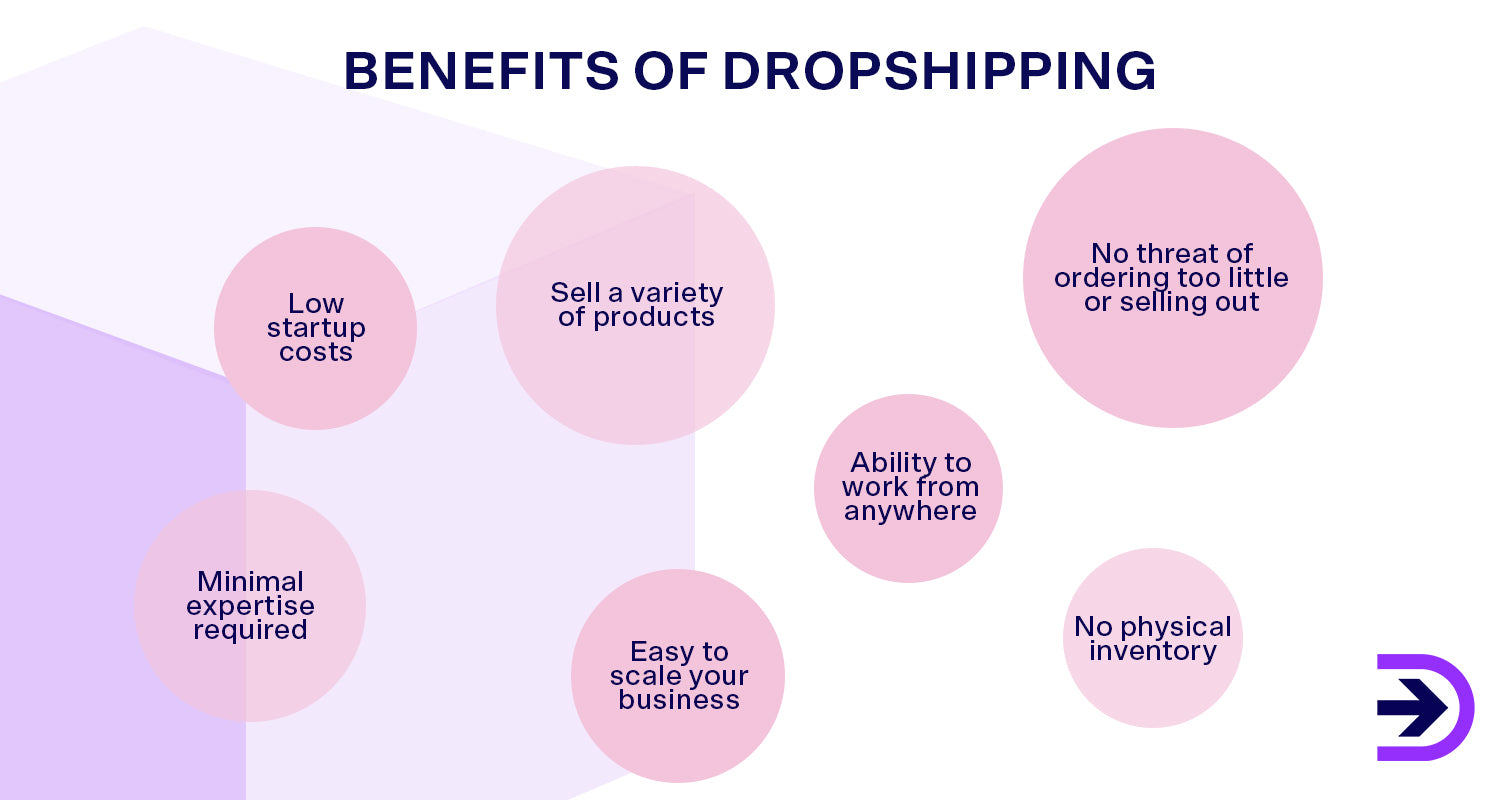
Find dropshipping wholesalers
One of the easiest ways to find dropshipping wholesalers is through a simple Google search. Reach out to local suppliers through email, and make sure you do your research. You want to make sure you’re working with the best wholesalers that align with your business values and goals, otherwise, you may find you run into a lot of problems along the way.
Look for dropshipping wholesalers who are legitimate, there are a lot of scammers out there. The best way to do this is to do extensive research or use something like a marketplace that only works with reputable wholesalers.
Get to know what kinds of logistics your dropshipping wholesalers have, as dodgy technology and supply chains are tell-tale signs that you’ll run into a lot of issues with changes in seasonal demand throughout the year.
You’ll also want the business you are working with to operate locally to you, as this gives you the best chance of low and fast shipping prices and times, meaning you can get more products to your customers, more often.
You should aim to choose simple products that allow less room for error or returns based on the number of hours you want to invest in your business. If you are okay with having a more technical business, then you might find it beneficial to sell something like electronics. However, if you want to cut down on your hours spent replying to customer queries, it’s best to opt for simple products that require little to no assembly as these are more likely to be easier to ship.
Choose Dropshipzone as your wholesale supplier
If you’re looking for a way to resell wholesale products that are high-quality and reliable, Dropshipzone is the B2B2C marketplace for you. With thousands of products from trusted Australian wholesale suppliers and fast shipping times, you can easily make a start on the ecommerce business of your dreams.
Sell online with Dropshipzone’s low setup costs, there are no ongoing fees, and it is easy to use with 24/7 assistance and a dedicated team to help you with anything. Our suppliers will ship the products to your customers on behalf of your brand, all you have to do is pick the products you want to sell and list them on your website. We’ve got instantaneous order syncing, so you can get a snapshot of your digital inventory anytime, wherever you are in the world.
Buying wholesale with Dropshipzone gives you access to a multitude of discounts, and you won’t have to search the internet for different wholesalers and commit to their different terms and conditions. You’ll be able to see all the businesses you can work with in one place.
You won’t have to hold any physical inventory, so you can easily monitor your bestselling products, as well as the products that might not be selling so well. Gone are the days when you would need a big spring sale to clear out space in your warehouse, with just a few clicks, you can get rid of that product that’s only sold a couple of units since you listed it.
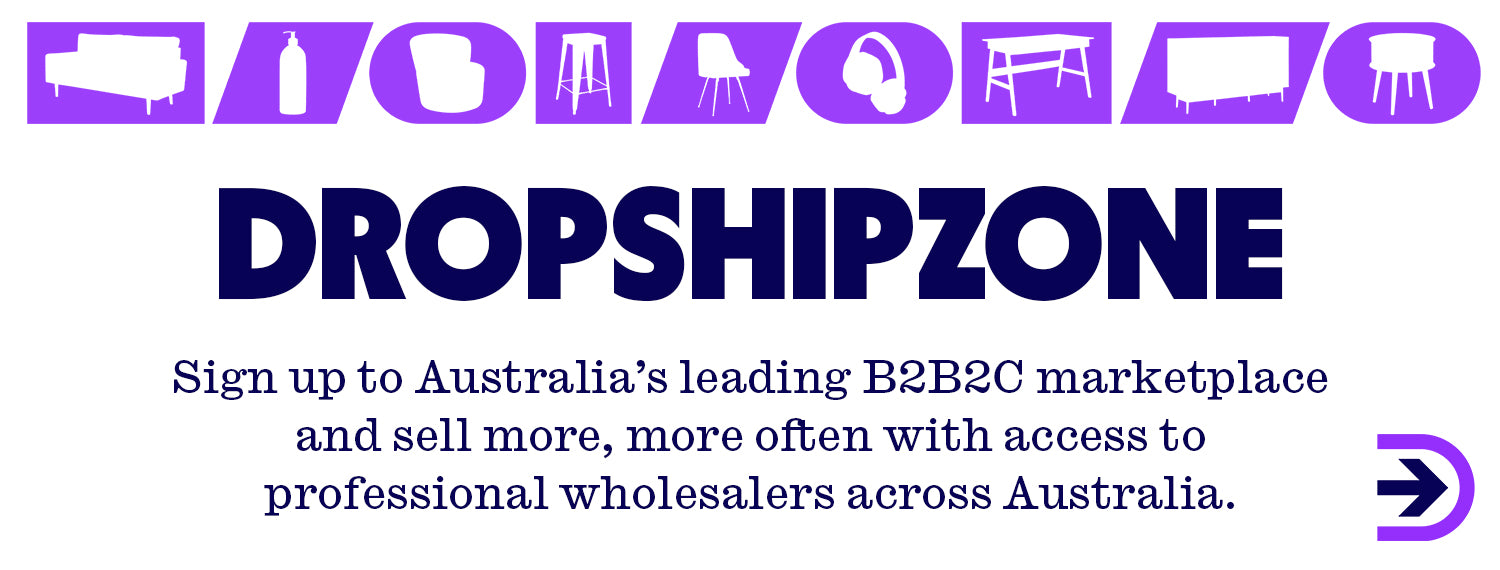
FAQs
Can you buy from a wholesaler and resell?
Yes, it is completely legal in Australia to buy and resell wholesale items. However, you will need an ABN and any other relevant licences based on your state’s consumer laws and the type of company you are running.
What is a wholesaler?
Traditional wholesalers act as the middle man between the manufacturer and the retailer and will buy products in large quantities at a discounted price to then sell in smaller quantities to retailers to earn a profit margin.
Is it better to buy and sell wholesale?
Buying and reselling through wholesalers is a great way to save money and time, and can provide your business with more stability. Buying wholesale usually means you get great discounts for buying in bulk, so you can earn more of a profit in the long run.
What’s the difference between wholesale and dropshipping?
With traditional wholesale, the retailer purchases from wholesalers and stores products in their warehouses until they are purchased by a customer, which they will then have to distribute and ship to the customer.
Dropshipping wholesalers cover everything to do with stocking and shipping products on behalf of the retailer, so you don’t have to worry about keeping a physical inventory. Instead, once a customer places an order with you, you order that item from your wholesale supplier and they pack and ship the goods directly to the customer.










